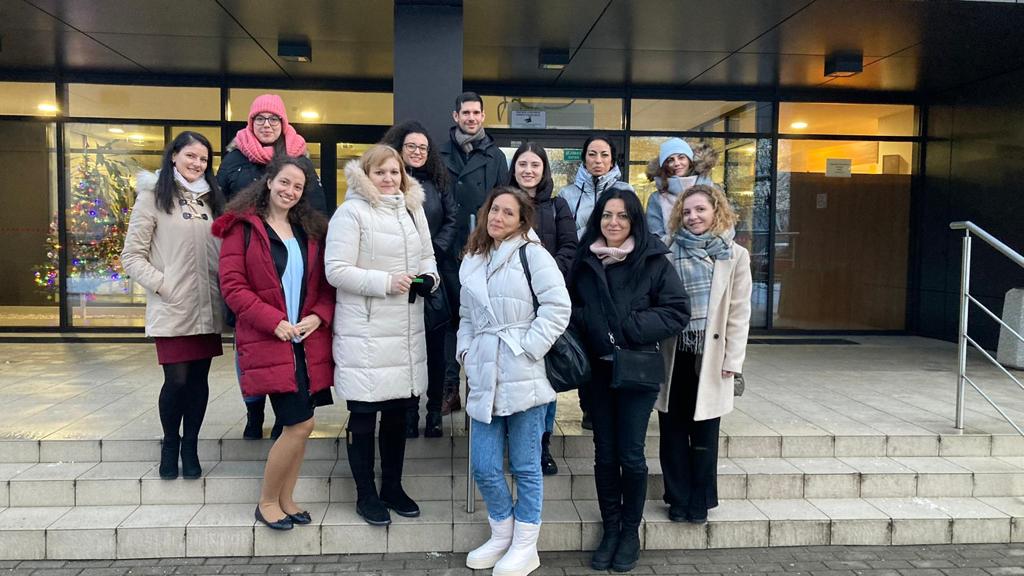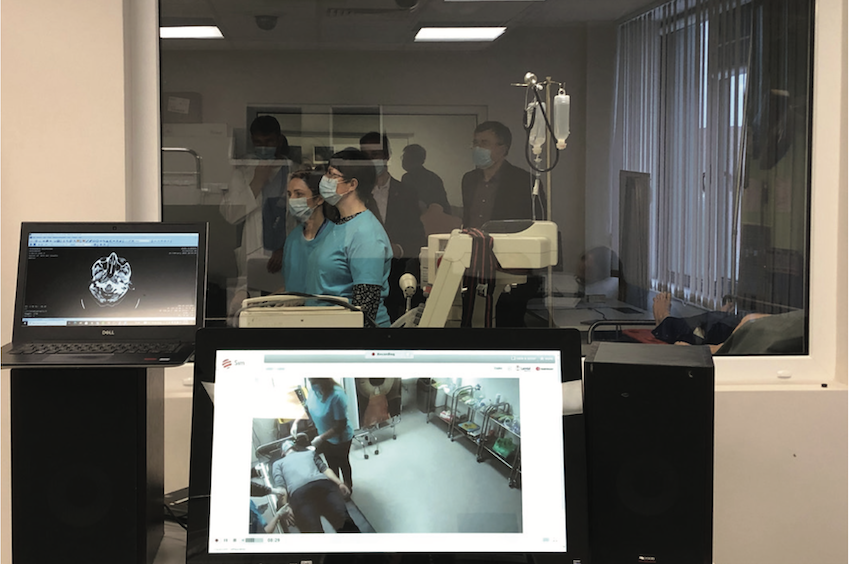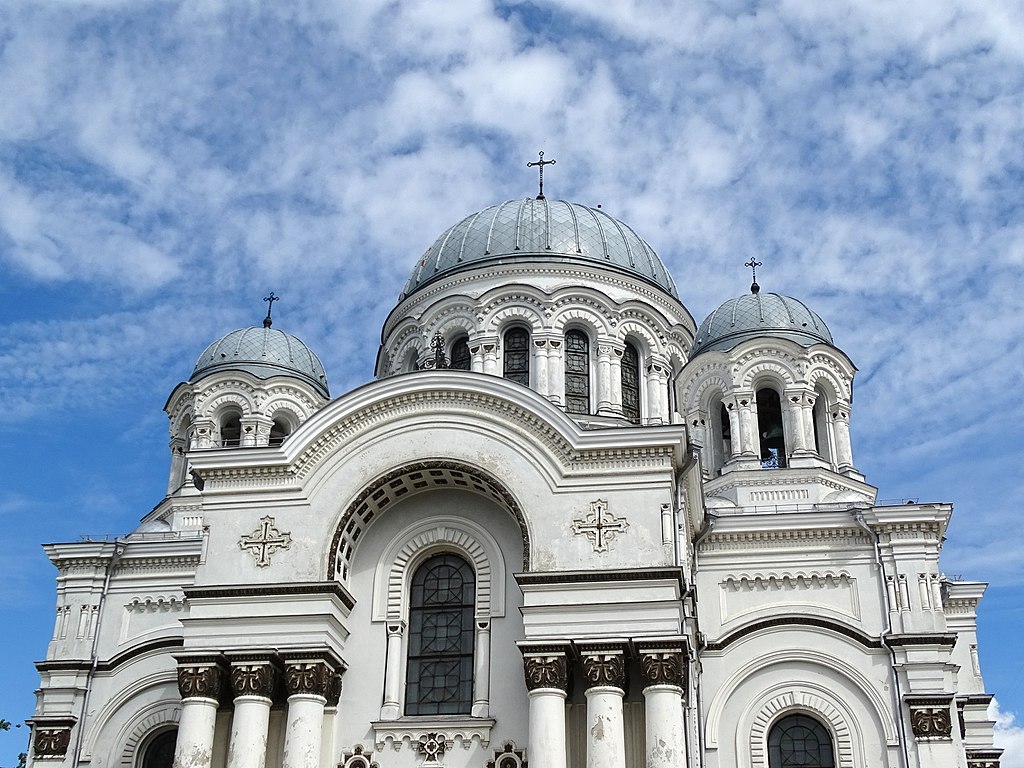
Dr. Lengyel Gabriella Kincsó adalah seorang dokter neurologi di Rumah Sakit Saint Pantaleon di kota Hongaria, Dunaújváros – seorang “ahli neurologi masa depan” saat ia menyebut dirinya di akun Instagram-nya, di mana ia memposting gambar baru pohon Natal yang sama setiap Desember. Namun demikian, pada Desember lalu, sebelum pohon Natalnya naik, Dr. Kincsó memposting galeri gambar yang ia ambil di Kaunas, Lithuania.
Ada Gereja Saint Michael the Archangel; benteng tertutup salju dan menara bata bulat Kastel Kaunas; dekorasi Natal di Laisvés Avenue, jalan pejalan kaki terpanjang di Eropa Timur, dan pintu masuk ke Rumah Sakit Universitas Ilmu Kesehatan Lithuania (LSMU), institusi medis terbesar dan tercanggih di negara-negara Baltik.
“Acara Simulasi stroke Kaunas dalam suasana Natal bersama tim ajaib,” keterangan tersebut berbunyi. Gambar terakhir adalah tentang “tim hebat” – sekelompok dokter dari Bulgaria, Hungaria, dan Rumania yang baru saja menyelesaikan pelatihan stroke selama dua hari di Pusat Simulasi di LSMU.
Ini adalah acara simulasi ketiga yang berlangsung di Kaunas karena suhu turun antara September dan Desember 2022. Yang keempat untuk dokter-dokter dari Ukraina telah direncanakan untuk bulan November tetapi ditunda setelah rudal liar menimbulkan kekhawatiran bahwa perang Rusia-Ukraina tumpah ke negara tetangganya di Polandia.
Lithuania berbagi perbatasan dengan Polandia, Latvia, Rusia, dan Belarus. Ini adalah negara bagian Baltik terbesar, sebuah wilayah yang terkena dampak stroke secara tidak proporsional. trombolisis intravena (IVT) tersedia di dua rumah sakit di ibu kota Vilnius pada tahun 2002, dan dari tahun 2007 pedoman terbaru Asosiasi stroke Lithuania merekomendasikan IVT sebagai lini pengobatan pertama untuk stroke iskemik. Trombektomi mekanis pertama dilakukan pada tahun 2012.
Namun demikian, kurang dari satu persen pasien stroke iskemik menerima terapi rekanalisasi pada tahun-tahun sebelum tahun 2014 ketika jaringan perawatan stroke nasional dibentuk dengan tujuan untuk memiliki rumah sakit siap stroke dalam satu jam jangkauan setiap satu dari 2.8 juta penduduk Lithaunia.
Sejak 2017, komunitas stroke di Lithuania mendapatkan dukungan dari Angels Initiative. pemantauan kualitas diperkenalkan dan rumah sakit terdaftar dengan RES-Q. Tingkat pengobatan pada tahun 2020 untuk trombolisis dan trombektomi setara dengan Rencana Tindakan stroke untuk target Eropa pada tahun 2030, dan tingkat mortalitas di rumah sakit telah turun di bawah 10 persen di sebagian besar pusat stroke.
Di LSMU di Kaunas, rata-rata waktu door-to-needle turun menjadi 34 menit. Selama kunjungan ke rumah sakit, konsultan Angels Rita Rodrigues diberi tur ke kampus, termasuk sebuah gedung baru dan pusat simulasi canggih yang telah didirikan sehingga mahasiswa dan penduduk dapat mempelajari cara mengelola situasi yang mengancam jiwa di lingkungan yang aman.
“Mengapa tidak menggunakannya untuk stroke?” sarannya.
Ini adalah gagasan yang mengubah pelatihan stroke di Lithuania, dan memicu kemitraan antara Angels dan LSMU yang akan menjadikan pusat simulasi di Kaunas sebagai tengara dalam peningkatan kualitas perawatan stroke di Eropa Timur dan Tengah.

Rencana AWAL untuk membawa kelompok internasional ke Kaunas untuk pelatihan meluluhlantakkan pandemi Covid tetapi dilanjutkan pada akhir 2021.
Pada Januari 2022, acara percontohan untuk dokter dari Ukraina, Belarus, dan negara tetangga yang lebih jauh, termasuk Georgia dan Moldova, merupakan keberhasilan besar yang akan menjadi model untuk acara mendatang.
Di podium pada hari pertama terdapat dua pakar dari Kaunas dan dua ahli dari Vilnius – ahli neurologi Prof Antanas Vaitkus dan Dr Prof Vaidas Matijosaitis dari Departemen Neurologi di LSMU, dan Dr Prof Aleksandras Vilionskis serta Prof Dalius Jatuzis, masing-masing kepala pusat stroke di Rumah Sakit Universitas Republican Vilnius, dan Klinik Neurologi dan Bedah Saraf di Universitas Vilnius.
Mereka memberikan gambaran tentang penatalaksanaan stroke hiperakut dan nilai simulasi dalam pelatihan stroke, dan membagikan perjalanan stroke di Lithuania selama lima tahun kepada Angels. Setelah tur unit stroke LSMU dan ruang gawat darurat dan pencitraan, saat itu adalah waktu tindakan ketika peserta dibagi menjadi beberapa tim dan diberi pengarahan tentang serangkaian skenario klinis.
Rita menjelaskan cara kerjanya. Peran dirotasi dalam tim sehingga setiap orang memiliki kesempatan untuk berpartisipasi sebagai neurolog, paramedis, pasien, dan perawat. Sementara satu tim berpartisipasi dalam simulasi, yang lainnya diberi peran yang harus mereka amati dengan cermat dan komentari selama pembekalan.
Sebelum acara, kuesioner pra-workshop diedarkan kepada peserta sehingga wawasan tentang kondisi di setiap negara dapat menginformasikan pilihan skenario klinis.
Kemampuan penyaji untuk menyesuaikan diskusi dengan tingkat pengalaman di ruangan adalah salah satu alasan acara ini begitu sukses, ujar Rita.
Keuntungan lainnya adalah pelatihan ini juga dapat ditawarkan dalam bahasa Rusia, yang digunakan sebagai bahasa asing oleh lebih dari 60 persen orang Lituania.
Dokter yang berkunjung juga harus banyak belajar dari tim stroke di Kaunas.
LSMU sudah menjadi pusat stroke terkemuka ketika Rita pertama kali berkenalan dengan Prof. Antanas Vaitkus dan timnya pada tahun 2017. Layanan gawat darurat, pencitraan, dan patologinya tersedia sepanjang waktu, pasien stroke diberi prioritas di laboratorium dan ruang CT, dan terdapat cukup tempat tidur khusus bagi pasien untuk menerima perawatan spesialis pasca-akut.
Jalur pasien stroke diorganisasi dengan baik dan menyertakan tindakan prioritas utama yang direkomendasikan oleh Angels – pengujian POC untuk glukosa darah dan INR, dan pengobatan pasien di CT.
Rita dan tim sepakat untuk menetapkan target door-to-needle di bawah 45 menit, meskipun dua simulasi berturut-turut menunjukkan bahwa mereka dapat melakukan lebih baik dari itu. Mereka menghentikan jam pada 15 menit di putaran pertama, kemudian mencukur delapan menit lagi di putaran kedua.
Lima tahun kemudian, LSMU memiliki jalur sempurna, kata Rita. Setelah pitstop cepat di ruang gawat darurat, pasien langsung menuju ruang CT (ada dua di dalam ER) dan setelah dirawat pasien masuk ke unit stroke.
Pengalaman Kaunas menetapkan standar tinggi bagi para dokter seperti “ahli neurologi masa depan” Lengyel Gabriella Kincs dan koleganya dari Rumania dan Bulgaria, tetapi itulah sebabnya mereka ada di sini. Selain itu, tim ajaib yang berpose untuk foto kelompok di luar pintu masuk LSMU di bulan Desember salju sekarang juga merupakan jaringan stroke informal yang anggotanya telah berjanji untuk terus berbagi pengalaman lintas batas.


